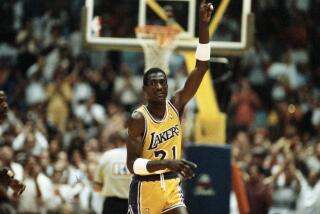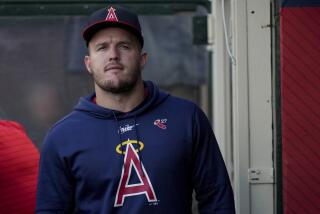Yardley Finally Enters the Hall
NEWPORT BEACH — Five knee replacements and 36 years after leaving his mark on the NBA, George Yardley will finally be a member of basketball’s elite fraternity--the Basketball Hall of Fame in Springfield, Mass.
Though he admits players less deserving were inducted into the Hall before him, Yardley never wrote the Hall of Fame committee, never told friends to write the committee on his behalf and he never stayed up nights wondering whether he’d get in.
In fact, until he read retired Baltimore sportswriter Seymour Smith’s letter to the Hall of Fame committee, Yardley wasn’t convinced he belonged in the Hall.
“The way he presented the argument, an analysis comparing me to some of the game’s top players, and with all my accomplishments, you had to be goony to say I shouldn’t be in there,” said Yardley, who will be inducted Monday with Gail Goodrich, George Gervin, David Thompson, Nancy Lieberman-Cline and Kresimir Cosic.
Yardley, a six-time NBA All-Star with Fort Wayne, Detroit and Syracuse who played at Newport Harbor High and Stanford, was the first NBA player to score more than 2,000 points in a season. He was one of the first to consistently shoot a jump shot. But Yardley, who has run a successful engineering business for the last 35 years, said he hasn’t had time to be bitter.
He’s simply grateful, at 67, that his time has finally come.
“The timing couldn’t be better,” he said. “To have all the people to share it with me is great. I think the people around me are more excited than I am.
“I’ve always felt individual honors are to be frowned upon. You don’t go through life looking for individual gratification. I always got more gratification winning a doubles [tennis] tournament than a singles tournament.”
Yardley said he owes his philosophy to his parents.
“Maybe I’m this way because my parents were always so supportive,” he said. “They never pushed me, but they always supplied me with the necessary equipment to succeed.”
And there isn’t much Yardley hasn’t succeeded at. In addition to his basketball exploits, he was an All-American AAU volleyball player in the open division, he won six U.S. Tennis Assn. national doubles tournaments in the mid-1970s (he won one title after his first knee replacement) and he has been known to win a few dollars on the golf course.
But Yardley has always excelled the most in basketball. Bill Sharman, who played against Yardley through high school summer leagues, college at USC and the NBA with the Boston Celtics, calls Yardley “one of my all-opponent heroes.”
Sharman, who coached Yardley for one season with the Los Angeles Jets of the American Basketball League in 1960-61, said he was one of many players and coaches who wrote the Hall of Fame committee on Yardley’s behalf.
“John Wooden, Pete Newell and many others wrote in support of George,” said Sharman, now a consultant to the Lakers. “I don’t know if people today could truly understand how good he was. He had probably the quickest release of anybody in the NBA. He was a deadly shooter and one of the only ones dunking the ball back then. This is an honor that is way overdue.”
Yardley said he can’t be sure why he wasn’t voted into the Hall sooner but he guesses that his short NBA career--seven years--weighed against him.
How great would Yardley be today?
“I wouldn’t play today,” he said matter-of-factly. “None of us could. We’d have played like the girls do now. A lot of my contemporaries write and call when they hear that I say that, but I don’t care. I had the best vertical jump of anybody in basketball at 33 inches. Now, everybody has at least a 40-inch vertical. To say we could play today would be ridiculous.”
Upon hearing Yardley’s comments, Sharman said his old friend is being ridiculous.
“Did he say that?” Sharman asked. “Today’s players are bigger and better, but George would be one of the star players. He could dunk, he was a smart player, a good passer and a good rebounder.”
Notice he didn’t say Yardley, a 6-5 forward who averaged 19.2 points during his career, was a good defender. In Yardley’s later years, one of his tasks was trying to defend Laker forward Elgin Baylor.
“I guarded him, not very well though,” said Yardley, whose last year in the NBA was the 1959-60 season. “We had some duels. If it weren’t for me, Elgin would have been the worst defender in the league.”
Though he says he couldn’t keep up with today’s athlete, Yardley said there is someone in the NBA whose game looks a lot like his--Indiana Pacers’ guard Reggie Miller.
“He’s like me--selfish, a good shooter with a quick release,” Yardley said. “But I wouldn’t do all that trash talking. I would never do anything that would make you look that stupid.”
But Yardley admits he was far from a model citizen on the court.
“The minute I stepped on that court, I hated my opponents,” he said. “In order to play my best, I had to have a very distasteful opinion of who I was playing against or I couldn’t play. The madder I got the better I played. I’m low-key to start with, so getting mad got me focused.”
Now, however, he doesn’t even get mad thinking about how much money he could make in today’s era of $10-million players.
“Had I had $10 million at 35, I don’t know what I would have done with it,” said Yardley, who never made more than $25,000 a season. “A lot of those guys making big money wind up destitute with no life, no money, nothing. They’ve been pampered their whole life and they don’t know what to do without sports.
“Me, I never looked back when I left the game. The day I quit, I had this business.”
But the business will shut down Monday so its president can be inducted into the Basketball Hall of Fame. Yardley said he doesn’t know whether Monday’s ceremonies will be emotional.
“They say you’ve never really been through anything like that,” he said.
More to Read
Go beyond the scoreboard
Get the latest on L.A.'s teams in the daily Sports Report newsletter.
You may occasionally receive promotional content from the Los Angeles Times.










